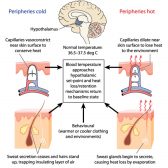theory of electrolytic dissociation –>
Arrhenius doctrine
The theory of electrolytic dissociation (1887) that became the basis of our modern understanding of electrolytes: in an electrically conductive solution (e.g., acid, base, or salt), free ions are present before electrolysis, and the proportion of molecules dissociated into ions can be calculated from measurements of electrical conductivity as well as of osmotic pressure.
Synonym: arrhenius law.
Dictionary > Theory of electrolytic dissociation
You will also like...

Psychiatry & Mental Disorders
Different mental disorders are described here. Read this tutorial to get an overview of schizophrenia, affective mood di..

Control of Body Movement
Some of the body movements can be controlled at will, others cannot. The body has a motor program, which is the pattern ..

Ecosystem Succession
If the balance of nature is left untouched, landscapes can change dramatically over time. A previous ecosystem is supers..

A Balanced Diet – Minerals and Proteins
Proteins and minerals can be derived from various dietary sources. They are essential for the proper growth and developm..

Growth and Plant Hormones
Plants, like animals, produce hormones to regulate plant activities, including growth. They need these hormones to respo..

Temperature Regulation in Animals
This tutorial elucidates body temperature regulation. Know the details here to learn how the body sets the body temperat..

